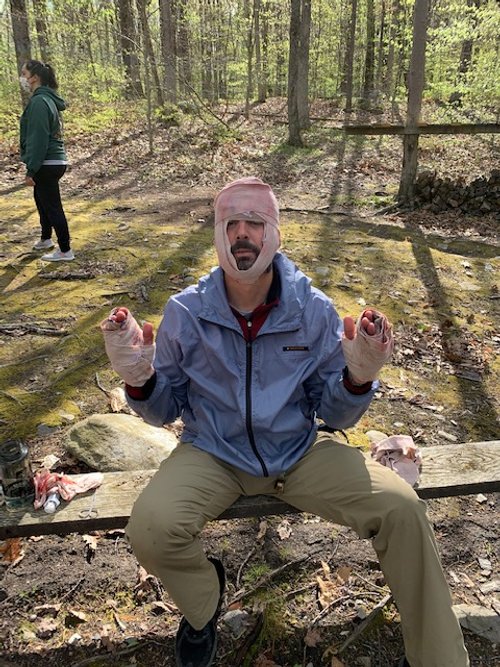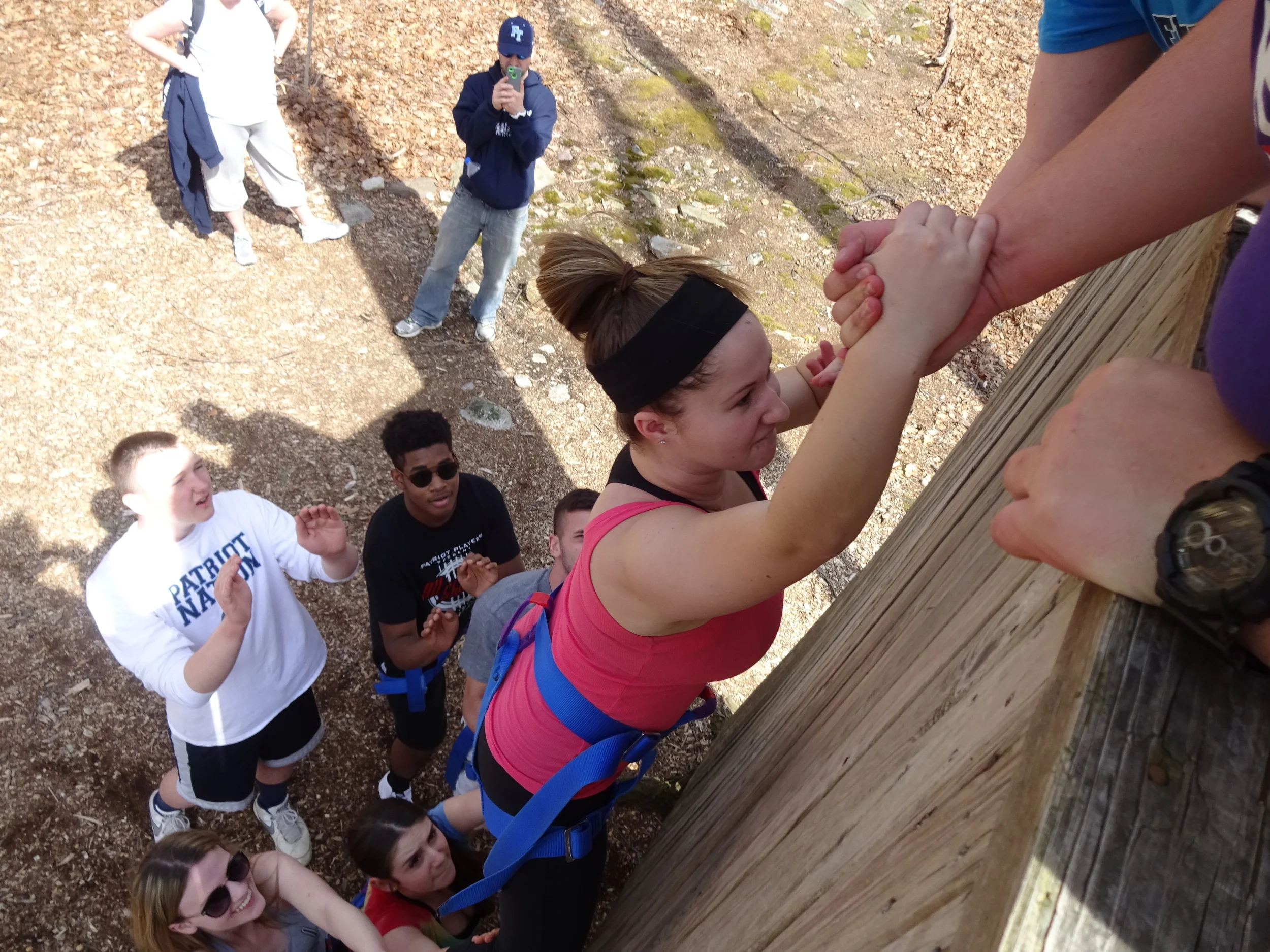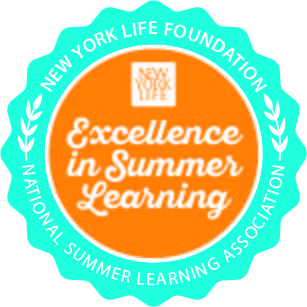Interviews on How the Princeton-Blairstown Center Builds Leaders and Welcomes Diversity
/Handy Pierre is a Program Manager at the Princeton-Blairstown Center. Born and raised in Princeton, NJ, Handy had the opportunity to attend the Princeton-Blairstown Center through the Corner House Leadership Program where he also served as Co-President of the Student Board. He joined the staff of the Princeton-Blairstown Center in in 2019 as an Experiential Education Facilitator. He was promoted to Senior Facilitator in 2021, and in 2022 he was promoted to Program Manager.
Handy Pierre, Program Manager, at the Blairstown Campus
Q: Would you describe yourself as a natural leader?
A: Yes! I’ve been fortunate to have had opportunities to be a part of leadership programs throughout my high school career and continue to apply those experiences to my life today.
Q: Describe your leadership journey with PBC from participant to program manager and what have you gained from each step of your journey?
A: In 8th grade, I was selected to be a part of “Peer to Peer,” a program aimed at reducing the incidents of tobacco, alcohol, and drug use among middle school students. We were trained by Corner House and John Witherspoon Middle School staff to conduct substance abuse prevention, leadership, inclusion, and anti-bullying workshops for the students in the 7th grade health classes. This would be the start of a long relationship with Corner House. As a sophomore at Princeton High School, I joined Project GAIA (Growing Up Accepted as an Individual in America) which is a program of high school students in the public and private schools in Princeton aimed at stopping hate, promoting peace, combating bullying, and learning acceptance of others.
GAIA 1 members provided workshops on inclusion, bullying, and diversity to 2nd grade students at Princeton Public Schools. That summer before my sophomore year was the first time I attended the Corner House Summer Leadership Institute at PBC, though it wasn’t my first time at PBC. Through leadership and DE&I workshops, I learned what it meant to be a Corner House Leader and the responsibilities that came with the privilege. We were taught that highly effective leaders always assume goodwill of those around them, especially during times of conflict. Even if someone else’s actions are antithetical to yours, you must start from a position of assuming their intentions are good. I naturally progressed to GAIA 2 in my junior year where we created skits to perform for middle school students about diversity and acceptance of others.
At the end of my junior year, I applied to be a part of the Corner House Student Board (CHSB). As Co-President of the board, I got to bring a student’s perspective to all agency activities and programs. I also served on selected municipal boards to also provide a student perspective.
CHSB gave me the opportunity to work with and lead other student leaders in the various Corner House programs. During my college career, I was invited to chaperone The Corner House Summer Leadership Institute sharing my experiences after high school with the incoming leaders.
Q: What skills and experiences did you acquire to help you move to the next stage?
A: As a facilitator, I remembered what I learned throughout my time as a Corner House leader and applied SEL (social emotional learning) and DE&I (diversity, equity, and inclusion) to my facilitation style. I really enjoyed providing programming to the participants that would come to the Center and strived to create a safe space for all.
As I progressed to Senior Facilitator, I became the assistant coordinator of the Summer Bridge Program at PBC. I helped with training and supervising staff, specifically the Summer Bridge Instructors and Facilitators. We were responsible for providing interdisciplinary academic curriculum (STEM/Literacy/SEL) as well as associated adventure-based experiential education programming at the Blairstown Campus and off-site locations. Through training, monitoring, and motivating all PBC summer staff, they were equipped to efficiently deliver high quality programming in a safe and culturally responsive manner.
All these experiences culminated to my current position at PBC. As a Program Manager, I develop, manage, coordinate, and evaluate progressively sequenced, age-appropriate programs which address the group’s goals, objectives, needs, and interests. I supervise and coach staff as assigned and evaluate their performance. I also support the Vice President of Programs and Assistant Director in all aspects of program management, coordination, implementation, and delivery at the Blairstown Campus. The transition from Facilitator to Program Manager was made easier due to my extensive leadership journey.
Q: Who have you been influenced/mentored by on your leadership journey? How has that person/s helped you become a better leader?
A: Throughout my journey, Gary DeBlasio (Director of Corner House) became a huge influence and mentor in becoming the leader I am today. Calvin Reed (Youth Outreach Coordinator) also played a huge role in preparing me for life after high school.
Q: During your time at the Center have you seen more of a focus on developing and hiring diverse leaders?
A: PBC has been effective in hiring diverse leaders in the facilitation position and I hope to see some of the facilitator’s progress into larger roles in the organization as I have been fortunate enough to do. Living in our current social and political climate, it’s becoming more important to create more diverse and inclusive spaces. PBC has shown its ability to focus on developing and hiring diverse leaders and while I’m grateful for PBC’s dedication to the work, I think it’s important to acknowledge that we have a lot further to go.
Pam Gregory is the President & CEO of the award winning, 114-year-old Princeton-Blairstown Center, located on 268 acres in Blairstown, NJ near the Delaware Water Gap National Recreation Area. She serves on the Board of Directors of the American Camp Association, NY/NJ.
Clockwise from top left: PBC President and CEO, Pam Gregory; Florence Broadway; John Broadway; and Ev Pinneo. John was a camper when Ev was student director of the Princeton Summer Camp.
Q: How does the Princeton-Blairstown Center develop leaders?
A: The Center works to help everyone, from our youngest participants to our most mature employees, develop their leadership potential. Most people have some natural leadership skills, but without training and practice few can reach their fullest potential. The Center focuses on helping everyone – students and staff – learn to “listen to understand,” practice reflection, develop a set of tools to work cooperatively with others, build respectful and authentic relationships, build grit, take healthy risks, practice gratitude, and understand and manage their emotions.
Q: How would you describe Handy’s story/progression as a leader at the Princeton-Blairstown Center?
A: Handy came to the Center as a high school student via Corner House as part of its peer leadership program. He returned in 2019 to join the staff as a seasonal Facilitator after a friend told him about an open position. Handy quickly connected with the work, our students, and the place. He also demonstrated a desire to grow personally. He was slated to return in 2020 when the pandemic hit. He did a bit of online adjunct work for the Center that first year of the pandemic and returned as a seasonal Facilitator in 2021. When a year-round position opened for a Senior Facilitator later in the year, Handy was selected. He also took on the role of Assistant Summer Bridge Coordinator which involved supporting, coaching, and helping to oversee our award-winning academic and social skills enrichment program. His first foray coaching and supporting staff was successful and demonstrated that Handy was ready for more opportunities.
In early 2022, when we were looking to add a third Program Manager to the team, Handy was chosen over numerous other candidates because of his high level of social-emotional skills. Handy’s perennially positive attitude, experience working with the Center’s students, background in the hospitality and customer service fields, coupled with his desire to continue to grow as a leader and manager, further demonstrates why he was selected to fill this important role. Handy embraces the Center’s philosophy of being the “guide on the side” whether he facilitates students or coaches one of his direct reports. He has taught us all to remember and embrace his mantra, “always assume goodwill of those around you”, even when they say things that don’t align with your values.
Q: What is the goal of focusing on developing leaders?
A: Good leaders have a high level of social-emotional agility. Emotional Intelligence is three times more likely a predicator of success than IQ. Thus, we focus on developing staff members’ social-emotional skills. Some of our staff will move on with us while others go into other important “helping” professions like teaching, social work, nonprofit work, medicine, etc. At the Princeton-Blairstown Center, we aim to be a training center for the young professionals we hire.
Research tells us that employees don’t quit their jobs, they quit their managers. Therefore, it’s important to develop empathetic leaders who can problem solve and read social cues in real time. We are very fortunate to have a VP of Programs with advanced social-emotional skills and decades of experience developing educators. He models, scaffolds, and coaches our team to be their best selves as leaders every day.
Q: Why is it important to have diversity in leadership roles?
A: Representation matters. It’s important for all young people to see people who look like them or come from similar backgrounds represented at all levels of education, government, and the private sector. It sends subtle and not so subtle messages about what they can become and achieve as they look to their futures. As a female growing up in Louisiana in the 1960s and 1970s, it was critically important for me to see women in non-traditional leadership roles. The outdoor educational field has historically been dominated by cis-gendered males. Historically that was true at the Center as well, and yet at least half of the students we serve do not identify as males.
Studies show that the more diverse a company’s workforce is, the happier, more loyal, and more engaged are its employees. This increases a company’s bottom line through creativity, innovation, and increased productivity. For the Center this means we are better able to advance our mission to help young people further develop their social-emotional skills. Sometimes folks focus on a very narrow definition of diversity, but we think about it in terms of gender, race, ethnicity, sexual orientation, religion, age, physical abilities, political ideologies, and socioeconomic status.
Q: How does the Princeton-Blairstown Center create opportunities for young people to become leaders?
A: The Center’s Leader-in-Training program takes students who have been to Blairstown through either Summer Bridge, a school trip, or a community-based agency trip and helps them learn and practice leadership skills through an intense six-week program. These students have the opportunity to return to the Center as summer and/or seasonal staff members.
We also create opportunities for college students to become leaders of our Summer Bridge Program or join our seasonal team. The growth we see in these young people over a summer and a season is incredible. This summer three of our staff from previous summers joined us for a week to facilitate Summer Bridge. All have gone on to be young leaders in their own right – one is a social studies teacher at a charter school, one works as a DEI Community Engagement Specialist, and one works as a Residential Life Associate at an independent school for young people from historically marginalized communities. They are such great examples and spokespeople for how the Center creates opportunities for young people to become leaders.
Q: How does the Princeton-Blairstown Center ensure people of color and people from historically marginalized communities have opportunities to be leaders in the Princeton-Blairstown community?
A: The Center actively recruits from communities of color. Four of our six summer staff members this summer were young people of color, one of whom was a returning staff member. We work hard to hire and promote from within whenever possible. We create ladders to enable people to stay with us for multiple years and we provide lots of opportunities for training.























